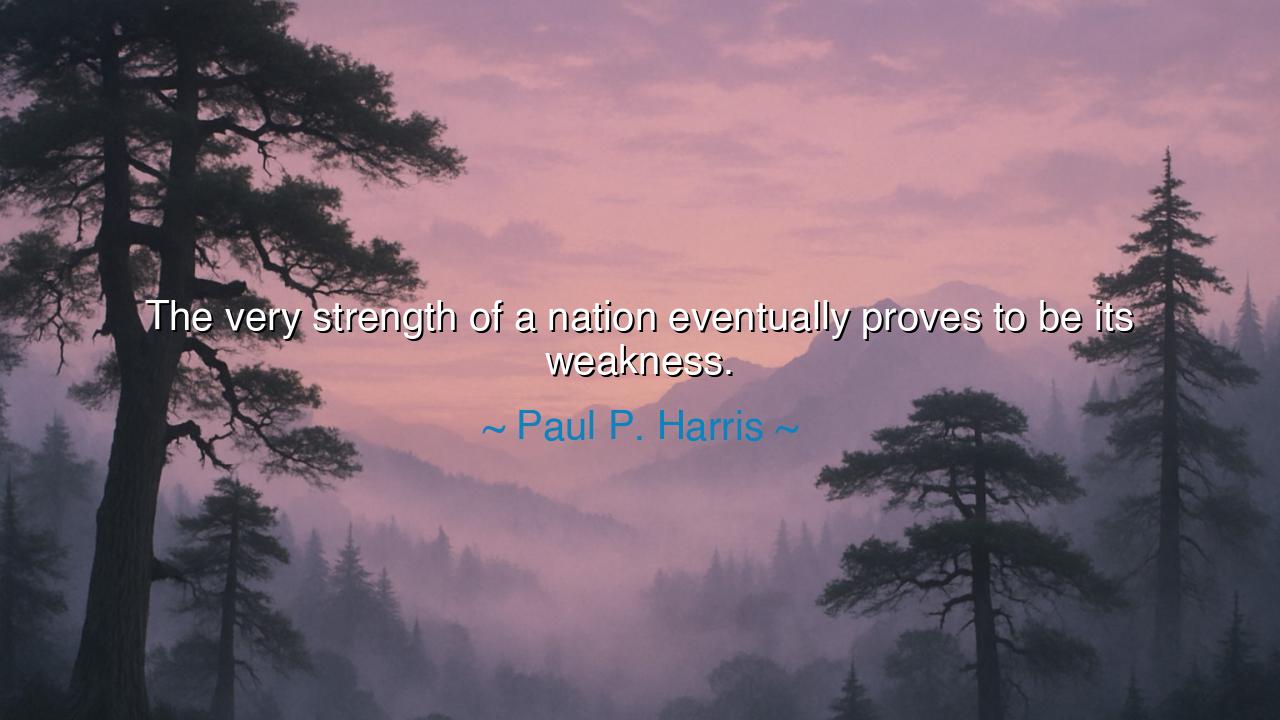
The very strength of a nation eventually proves to be its






Hear then, O seeker of wisdom, the words of Paul P. Harris: “The very strength of a nation eventually proves to be its weakness.” This saying, though simple in its form, hides within it the weight of centuries and the lessons of kingdoms long turned to dust. It speaks of the paradox woven into the fabric of human power, that what once uplifts a people, if left unchecked, may also drag them into ruin. The mighty pillar that holds the temple aloft may, in its excess, become the stone that crushes it.
Consider the fate of mighty Rome. Its strength lay in its armies, disciplined legions whose steel and courage subdued nations and expanded its dominion across continents. Yet that very reliance on conquest became its weakness. As borders stretched beyond the horizon, the legions could no longer defend them all, and the weight of empire pressed too heavily upon its shoulders. The glory of Rome, which had risen from martial might, decayed under the same force, and the Eternal City was brought low. Thus we see: in the swelling of strength hides the seed of undoing.
This truth is not only for empires of old. In modern days, too, nations reveal the same destiny. Consider the industrial might of Britain in the nineteenth century. Her ships, her factories, her trade routes encircled the world. Yet the very machinery of empire bred arrogance, and the colonies upon which she relied began to demand their freedom. What was once a source of strength—vast colonial wealth—turned into a storm of rebellion and independence. And though Britain endures, she no longer rules as the sun across every sea. Her strength, too, became her weakness.
Why is this so? Because men and nations alike often mistake abundance for eternity. They clasp their strength so tightly that they do not see how it hardens into fragility. Wealth breeds pride, armies breed overreach, and knowledge without humility breeds folly. In this way, what first gives life can, without balance, invite decay. The river that nourishes the fields, when swollen with pride, bursts its banks and drowns the land it once sustained.
Yet do not despair, for the saying of Harris is not meant to condemn, but to guide. The lesson is not that strength is evil, but that strength must be tempered by wisdom, by restraint, and by vigilance. The sword must be sheathed as often as it is drawn; the fruit of abundance must be shared, lest it rot in hoarded storehouses. A nation, and a man, must remember that humility is the armor that protects against the wounds of greatness.
Therefore, O child of the future, take this teaching into your heart. Whatever your strength—be it your intellect, your wealth, your courage, or your influence—do not let it grow wild and unchecked. Balance it with humility, temper it with compassion, guide it with self-knowledge. Guard especially against pride, for pride is the shadow that follows every strength, waiting for the moment to devour it.
Let this be your action: reflect often on your gifts, and ask, “How may these serve not only myself, but others?” Use your power to uplift, not to dominate. Practice simplicity amidst plenty, patience amidst victory, generosity amidst strength. In doing so, you will not fall into the fate of nations that were betrayed by their own greatness. Instead, you will stand firm, like a mountain that endures storms, not because it is unyielding, but because it knows how to bend, how to channel the forces that rage upon it.
Thus is the teaching: strength is not safety, and greatness is not eternal. But with humility, vigilance, and wisdom, the strength that might destroy you can become instead a source of life that endures for generations.






AAdministratorAdministrator
Welcome, honored guests. Please leave a comment, we will respond soon